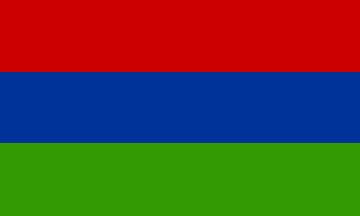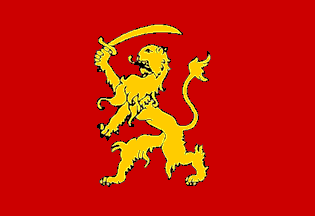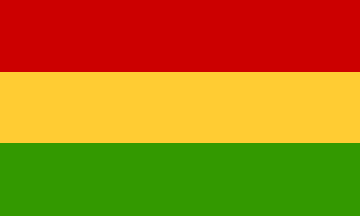teban.gif) colorized by Alex Danes, 23 September 2009
colorized by Alex Danes, 23 September 2009
Last modified: 2013-06-01 by alex danes
Keywords: banat | romania | austro-hungarian empire | serbia | landesfarben |
Links: FOTW homepage |
search |
disclaimer and copyright |
write us |
mirrors
See also:
teban.gif) colorized by Alex Danes, 23 September 2009
colorized by Alex Danes, 23 September 2009
The Banat of Temeswar was a Habsburg province that existed between 1718 and 1778.
In 1778, the province was administratively incorporated into the Kingdom of Hungary,
under Habsburg reign. Its coat of arms can be seen here
and here. It seems that the
Banat of Temeswar never had a Landesfarben flag.
Its coat of arms consists of a shield with a guarding tower on a blue field, flanked by wooden walls on
each side. Underneath it lies a green field of grass. The shield is crowned with a princely crown and flanked by
two eagles. Over it, a sceptre and a sword crossed at their base. Each one has "the eye of God" on top. Under the
shield and eagles there is a banner with the Latin words "PROVIDENTIA AUGUSTORUM".
Alex Danes, 25 September 2009
The Voivodeship of Serbia and Banat of Temeswar was an Austro-Hungarian dutchy that lasted from
1849 until 1860, when it was incorporated to Hungary. Today the area is divided between Hungary,
Serbian Vojvodina and Romanian Banat. Again, I'm not aware of any particular Landesfarben
for this province.
In 1849, the National Guard from Zemun established that the coat of arms of the dutchy is going to be
a shield with the coat of arms of the Serbian principality,
crowned with the crown of the Hungarian king Stephan I.
The shield is flanked by the arms of Srem and Bačka
on dexter and by the arms of Banat and Baranja on senester.
Alex Danes, 25 September 2009
According to Wikipedia,
"The Banat Republic (Banater Republik/Bánáti Köztársaság/
Republica Bănăţeană/
Банатска република) was a short-lived state, proclaimed in Timişoara,
on November 1, 1918, as the Austro-Hungarian Empire collapsed. The republic was an attempt
to preserve the integrity of German and Hungarian political elements in Banat region at the
moment of the Austrian-Hungarian Empire decay. On November 1, 1918, Otto Roth proclaimed
the Republic of Banat from the balcony of the Timişoara local council. The civil leader of the
Republic was Dr Roth while the military commander was Albert Barta.
The Government of Hungary recognized the independence of the Banat Republic.
On November 15, 1918, Serbian troops entered the Banat and put an end
to the Republic."
Chrystian Kretowicz, 21 September 2009
The Banat Republic of 1918 certainly had the flag, but it isn't
recorded reliably anywhere on the net. I have in my old files two flags labeled
"Banat Republic", but without any elaboration or mention of sources.
One is like a Dutch tricolor and the other like the flag of
Yugoslavia (plain).
 image by Alex Danes, 22 September 2009
image by Alex Danes, 22 September 2009
Wikipedia Commons shows
a dubious flag of "Banat Republic". I've said it is dubious as it comes
from the alternate history website, but it has the colors roughly corresponding
to the old (1718-79) Austro-Hungarian Arms granted to Banat of Temeswar
and to the Arms of Vojvodina.
Chrystian Kretowicz, 21 September 2009
 image by Chrystian Kretowicz, 22 September 2009
image by Chrystian Kretowicz, 22 September 2009
Another flag, this time of "Republika Banat", is shown, with the
concise history, here,
and is almost like the banner of the Banatski forum,
an autonomist party in Vojvodina.
Chrystian Kretowicz, 21 September 2009
The red flag with gold lion actually seems to be derived from an image of the present-day coat of arms of Vojvodina, because it copies the design of its sinister chief quarter. Consequently, its authenticity is dubious, even if the design itself is not. (A necessary correction: Banatski forum is a regionalist non-governmental organization, not an autonomist party, and does not use the flag as a symbol of its own).
Tomislav Todorovic, 21 July 2011
 image by Tomislav Todorovic, 21 July 2011
image by Tomislav Todorovic, 21 July 2011
The red-blue-green tricolor was obviously created for the needs of the Alternative History wiki - as can be seen here. There was an earlier version, a red-yellow-green tricolor, probably derived from the coat of arms with the gold lion on red field, which was in reality often depicted (incorrectly, it seems) as being charged with a green base as well, on which the lion was standing. The current version, athough a different explanation was given at the Banat Republic page, might actually be derived from the COA shown there, which is fictional, although partly based on the COA which was really used by the Hungarian county of Temes. It is also possible that the newer version was introduced in order to give the alternative-history state a flag which would bear less resemblance to any of its neighbors' flags than the original version.
Tomislav Todorovic, 21 July 2011